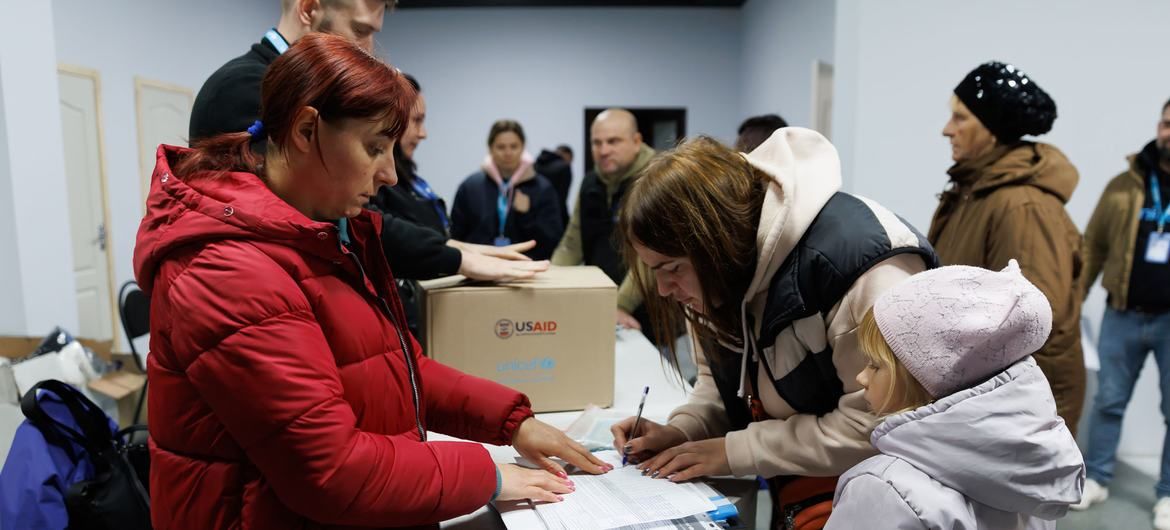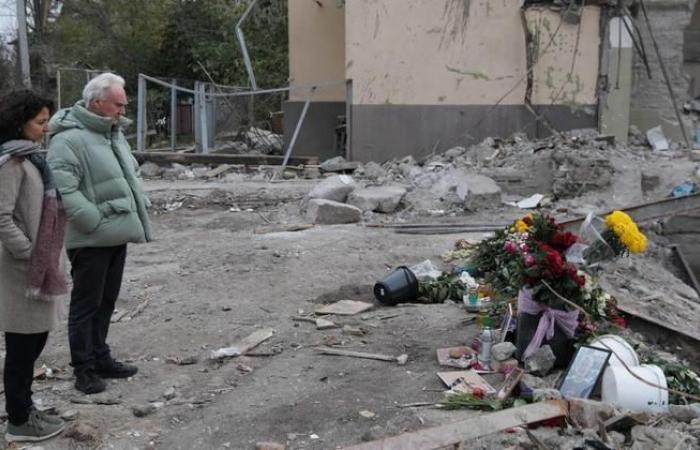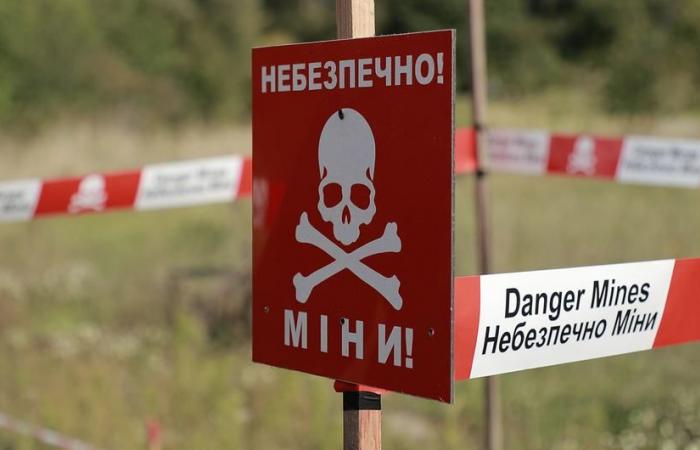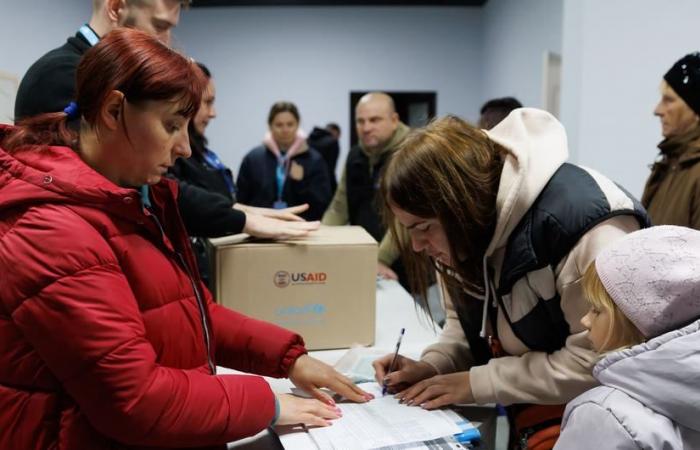“I am continually inspired by the strength and courage of the Ukrainian people. During my travels to Kharkiv, Kherson, Mykolaiv, Sumy, Zaporizhia and more recently to Kramatorsk and Lyman, I was able to see for myself the effects of the disruption of essential services such as electricity, water and heating on populations.
I spoke to people whose loved ones were killed and whose homes were destroyed in the attacks. I met people in transit sites who had to leave their lives behind, carrying everything they could save in a small bag. Every day, they demonstrate extraordinary determination, not only by getting up and getting on with their lives, but also by helping others.
The Ukrainian government and local authorities are doing an impressive job responding immediately to the attacks so that people who want to return can do so as quickly as possible. One of the governors told me that after an attack that damaged 13 buildings, they managed, with the help of their partners, to seal all the windows and restore water, electricity and heating so that people can return home within four days.
People are receiving psychological help after missile attacks damaged homes across Ukraine.
“Widespread trauma and psychological distress”
I feel that this prolonged war has led to widespread trauma and psychological distress. The need for mental health support is clear and it will take years to help people cope with the invisible consequences of war.
On the other hand, I see that people are starting to rebuild as soon as possible, whether it’s businesses, homes, or lives. The future begins as soon as the sirens stop. I saw people returning to rebuilt homes or entering new homes in tears of relief. People don’t want to leave; they want to stay in their communities. And, of course, everyone I spoke with wants the war to end, although many emphasize that this cannot come at the cost of not regaining and maintaining their territorial integrity.
And I would like to reiterate the Secretary-General’s message on the need for justice and peace in Ukraine in accordance with the United Nations Charter, international law and General Assembly resolutions.
The United Nations in Ukraine stands ready to continue providing lifesaving assistance. At the same time, we will continue to seek medium- and long-term solutions that help affected people and communities rebuild and reduce their dependence on external assistance. I only hope that our determination to support Ukrainians for as long as they need us will give them hope for a more dignified future.
© UNDP Ukraine/Ksenia Nevenche
A sign in Ukraine warns of the presence of landmines.
Rebuild the country
It goes without saying that the destruction of essential services poses major challenges to the country’s economy and development. Education and health systems are under immense pressure, compounded by growing mental health problems as people face isolation, freezing homes and the stress of ongoing war.
The Russian Federation’s systematic and deliberate targeting of Ukraine’s energy infrastructure constitutes a serious violation of international humanitarian law, inflicting predictable and widespread harm to civilians.
The United Nations Development Program (UNDP) estimates that more than 60% of electricity generation facilities have been damaged since 2022. Now that winter has set in, there is an urgent need to tackle the crisis worsening energy situation and to work together to support the Ukrainian people during this critical time. Of course, restoring access to energy is essential to ensure essential services operate and no one is left behind.
UN agencies are helping communities clear debris and mines, repair homes, schools and hospitals, build new social infrastructure, provide basic services and mental health and psychosocial care, and supporting livelihoods and employment – all priority issues for the government. The question is how to scale up these efforts, because the needs are high.
Ten million Ukrainians were displaced. Of these, 3.5 million are housed in communities across the country. Many of them lost their livelihoods; they need housing and work, schools and kindergartens to take their children to, and hospitals.

© UNICEF/Oleksandr Osipov
UNICEF has launched the distribution of winter clothes to families in the eastern regions of Ukraine.
Planning for Ukraine’s future
Humanitarian organizations have established emergency response mechanisms to the ever-changing and increasing needs across the country. We have demonstrated flexibility and impact time and time again and will continue to do so.
While humanitarian aid must continue at a sufficient scale to support the most vulnerable, recovery efforts must be continued and intensified to offer medium-term and more sustainable solutions to the most affected communities and populations. This requires significant and stable financial resources in the medium and long term, allocated efficiently and transparently, and, of course, planning.
In my meetings with leaders from all regions, I have been impressed by their willingness to plan for the future. They are preparing for long-term solutions while remaining flexible to respond to pressing daily problems imposed by the ongoing war.
At the UN, we are considering different scenarios to deal with the uncertainty of the future. Of course, we must support continued contingency planning and help ensure the humanitarian response continues. At the same time, crucial priorities such as demining as a prerequisite for economic recovery, housing solutions for displaced people or meeting the needs of ex-combatants, demand planning and a high level of coordination between UN agencies United Nations, the Ukrainian government, donors and international NGOs (INGOs) are needed.
As I saw during a trip to Izium in the Kharkiv region, agriculture, which is vital for the survival of local communities, faces increased risks due to the widespread presence of explosive remnants of war .
Farmers cultivate their fields to provide for their families, fearful of running into a mine or unexploded ordnance. It is very compelling to see the government, NGOs and the UN – in this case FAO and WFP – working together to combine humanitarian mine clearance of agricultural land and helping farmers regain their livelihoods agricultural.
Another example is equipping water wells in the Mykolaiv region with solar-powered pumps that reduce grid dependence and are a precursor to green recovery. And I’ve seen classrooms built in underground subway stations to maintain education and balance the challenges of online teaching. These are all wonderful examples that we must develop with all available resources.
How does the UN support Ukraine?
This winter, the UN:
- Delivering over 500 MW of distributed power generation and solar capacity to help rebuild damaged critical energy infrastructure.
- Supports the modernization of critical infrastructure to ensure energy efficiency and access to electricity, heating and water for the Ukrainian population.
- Provides generators and fuel to healthcare facilities and other essential public services to avoid disruption as much as possible.
In 2024:
- More than 630 humanitarian organizations provided at least one form of assistance to 7.7 million people across Ukraine.
- Many of these partners are national and local NGOs, dedicated to helping people in need, even in the most difficult circumstances.








